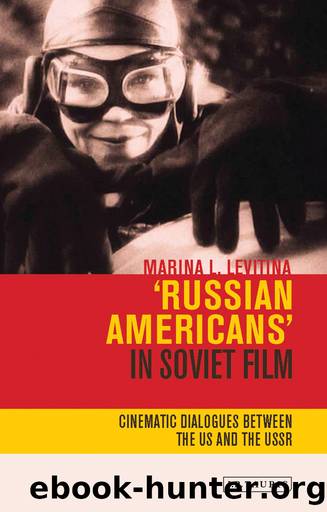Russian Americans' in Soviet Film by Marina L. Levitina

Author:Marina L. Levitina [Levitina, Marina L.]
Language: eng
Format: epub
Tags: Art, Film & Video, Performing Arts, Film, History & Criticism
ISBN: 9780857727701
Google: Ry-oDwAAQBAJ
Publisher: Bloomsbury Publishing
Published: 2015-09-29T22:29:50+00:00
Figure 17. Judy and Aniuta, from Daddy-Long-Legs and Happy Guys
The script for Happy Guys was written by Nikolai Erdman and Vladimir Mass, âthe best stage satirists of their time.â54 Its prototype was Leonid Utesovâs most successful jazz show The Music Store (1932), also written by Mass and Erdman. The film embodied âthe combination of Erdman and Massâ comic-satirical figuration of Soviet contemporaneity and Alexandrovâs cache of American comedy tropes.â55 The plot was built around Kostia Potekhin (Leonid Utesov), a shepherd who learns to play jazz music and who, in a series of gags and complications, is mistaken for a foreign conductor and ends up performing on the stage of the Bolshoi. Aniuta, Orlovaâs heroine, falls in love with Kostia from the moment she hears him sing his optimistic song âThe March of the Happy Guys.â Initially Kostiaâs love interest is Lena with her grotesquely bourgeois values and interests; however, after meeting the inebriated Aniuta on the stage of the Bolshoi and witnessing her singing talent, Kostia reciprocates her love.
The reason for Aniutaâs intoxication is that she is forced to drink some vodka so as to warm up during a heavy rainstorm (she explains that she does not normally drink alcohol). When she subsequently enters the Bolshoi Theatre, a close-up reveals the simplicity and âgirlishâ naivety of her facial expression, reminiscent of the expression of Pickford as Judy in the scene in Daddy-Long-Legs where she and her small friend accidentally become intoxicated after drinking alcohol. This naivety of Orlovaâs Aniuta was seen as a positive trait by a contemporary critic who, in her review of Happy Guys, noted that while Orlova was âtoo graceful and delicateâ to portray a peasant girl, she âwonderfully depicts the feelings of a naïve and very young girl, in a fresh and simple way; such feelings are familiar to hundreds of young women.â56
This girlish quality was a common trait of Orlovaâs heroines in Alexandrovâs comedies. Both Pickfordâs and Orlovaâs characters have been described as unerotic and non-sexual. We have already noted this quality in the case of Pickfordâs screen persona.57 This apparent lack of sexual appeal in Pickfordâs image (as opposed to the âvampsâ such as, for example, Theda Bara) was seen as positive by the Soviet critics in the 1920s, who called for âsimple, almost not prettyâ faces in women representing the New Soviet Woman.58 Stalin, the main âKremlin Censorâ of cinema,59 disliked displays of sexuality on the screen,60 which had major repercussions for representations of gender relations in Soviet cinema for decades to come. Maia Turovskaia has described Orlova as continually having to âconceal her healthy sexuality under the guise of a simpleton.â61 The Russian film critic Sergei Nikolaevich compared Orlova to Marlene Dietrich and Greta Garbo.62 While this description might apply to one particular heroine of Orlova, Marion Dixon in Circus, the comparison does not apply to the rest of her characters in Alexandrovâs comedies, who were largely presented as unerotic. Instead of sexual appeal, Orlovaâs screen heroines possessed a delicate angelic quality, best expressed in her voice and in what was seen as her angelic beauty.
Download
This site does not store any files on its server. We only index and link to content provided by other sites. Please contact the content providers to delete copyright contents if any and email us, we'll remove relevant links or contents immediately.
Still Foolin’ ’Em by Billy Crystal(36359)
Spell It Out by David Crystal(36117)
The Great Music City by Andrea Baker(32019)
Professional Troublemaker by Luvvie Ajayi Jones(29663)
Trainspotting by Irvine Welsh(21667)
Call Me by Your Name by André Aciman(20517)
The Secret History by Donna Tartt(19090)
We're Going to Need More Wine by Gabrielle Union(19046)
Cat's cradle by Kurt Vonnegut(15356)
Ready Player One by Cline Ernest(14675)
Molly's Game by Molly Bloom(14145)
Bombshells: Glamour Girls of a Lifetime by Sullivan Steve(14076)
The Goal (Off-Campus #4) by Elle Kennedy(13674)
Leonardo da Vinci by Walter Isaacson(13336)
4 3 2 1: A Novel by Paul Auster(12393)
The Social Justice Warrior Handbook by Lisa De Pasquale(12190)
The Break by Marian Keyes(9368)
Crazy Rich Asians by Kevin Kwan(9292)
The remains of the day by Kazuo Ishiguro(8999)
